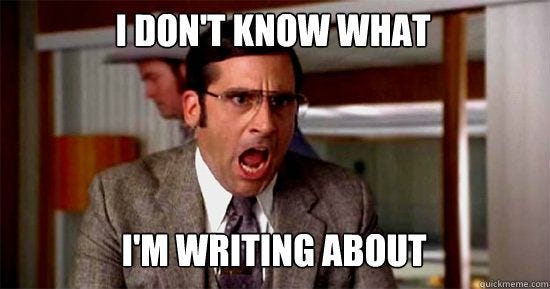Here's what I would do
A look at what people who work with me experience
Welcome, aspiring polyglot! The question of, “how can I make this process faster?” has come up quite often recently. Though focusing on what works best for you long term is always going to be best, the desire to feel progress on a faster timeline is near universal. For that reason we will be taking a look at a few of the things the people I work with one on one do. As cliché as it sounds, when it comes to languages and learning it is true that what you put in is what you will get out. Keep that in mind as we go through these exercises.
Doing difficult things
For those of you who missed it, I touched briefly on the logic behind this in a previous post that you can find below:
Climbing the mountain
Welcome, aspiring polyglot! Last week someone asked me an interesting question and I thought the answer might benefit all those who are seeking to become bilingual. For transparency’s sake, know that I work individually with this person and I have personally seen their growth and their struggles. It is with that background, and the background of having …
That, in itself, sums up the reasoning behind the following torture that I put my students through. Essentially, the belief is that anyone who can read The Count of Monte Cristo, as we sometimes do in my French classes, can easily talk about their day to day life. It may not seem directly related to the things you want to discuss, but it is impossible to write a book using fewer than 5000 words, especially a book as good as The Count of Monte Cristo. Learn 5000 words of any language and discussing basic topics will not be challenging for long.
Now consuming the words is one thing, but if the goal is to speak with native speakers sooner rather than later, then consumption cannot be the primary focus. Along with reading, the people I work with write. The ones who do the best write the most. There is almost an exact one to one correlation with language output and successful language acquisition. At least with regards to the goal of my classes which is to begin speaking with native speakers as quickly as possible.
Since writing requires one to think in their target language, it is impossible to avoid revealing one’s weaknesses when writing. Oddly enough, after a certain amount of time making mistakes in your target language while speaking becomes unnoticeable. This usually happens right around the time you realize that no one else is noticing your mistakes anyway. That is all the more reason to begin writing early on and continue throughout your language acquisition.
In my classes, this happens in a few different ways. Some people write anecdotal stories from the past, some write instructions for how to do something, like cultivate a garden, and some people build work out routines. It doesn’t really matter what you are writing about at the end of the day. What really matters is that you are writing every day and trying to work in new vocabulary and grammar whenever and wherever you can.
Much of this time will be spent doing things incorrectly. However, doing things incorrectly in a new language is normal and it is, coincidentally, the fastest way to improve. The longer you avoid finding out what your mistakes are the more time it will take you to address them. By writing from the start we have a plan of attack every week with regards to opportunities for improvement. When you know what you do wrong, you also know what you do well and you can use that to start speaking.
Comfort in silence
As far as speaking goes, something my students learn within the first three days of class is that I am extremely comfortable in silence. I am content to sit and wait until they find the words they need or a new way to say something. Of course, if they don’t know they don’t know and that is fine, but they have to ask me for help. It might sound a bit harsh, but at the end of the day I want them to feel comfortable asking anyone for help.
Most people are willing to go a long way to communicate with someone who is learning a new language. They will suffer through explanations, slog through directions, and do everything they can to accommodate. However, many people will not do any of that without being asked first. No one wants to feel like they are being rude by correcting someone, but if you are comfortable asking for help then you will find many people are willing to help you along.
Furthermore, this comfort in silence that I have plays an additional role. That is a buffer that causes people, in theory, to slow down. Around the 2 month mark, most people start to feel more confident and that confidence often manifests itself in an increase in speed. Unfortunately, this increase often backfires because in attempting to do things faster, much of the accuracy and precision is lost. This, in turn, is detrimental to confidence and can create a negative feedback loop.
By remaining silent, my goal over time is to make them comfortable with silence as well. There is a saying for emergencies that slow is smooth and smooth is fast. In theory, languages work the same way. If you take the time to think through your sentence all the way before you begin, the odds of you messing up halfway through and having to restart drop dramatically. Messing up halfway through a sentence, in the end, is far more damaging for one’s confidence than taking an extra 3-5 seconds of silence to properly formulate a sentence.
Nothing is quite as frustrating as stumbling through a sentence, being corrected, and realizing that you wouldn’t have needed that correction if you had just taken a breath first. This skill takes several weeks, if not months to master, so we begin from the very start. All of these are things you may not have considered, especially as a solo learner, so it is important to keep a reasonable time frame in your mind. These skills develop over months and years, not hours.
With that in mind, it is also important to remember that most of the time, awkward silences are only awkward because you feel like they are. I am not sure when it happened, but somewhere along the line I lost the ability to feel awkward. While this may be to my detriment in some scenarios, it is greatly advantageous when working with new languages. Growing to be comfortable in silence will serve you in both your native language and your target languages.
You may also find that people are speaking more. As is often the case, people love to talk about themselves and, as a new language learner, this is fantastic news. Rather than be concerned with whether or not you can formulate a sentence, you can focus entirely on actively listening to what is being said. Unfortunately, once you master speaking to people one on one, you will find yourself back in the active listening space as soon as you are in a group setting.
Still, that is only more time to practice and, from time to time, maybe even slip in a witty one liner. Learning new languages should improve your ability to listen. In fact, when done correctly, learning a new language should set you up to succeed in every area of life. You should be a better writer, a more adept speaker, and an expert listener by the end of it. In order to get to that point, however, you have to start.
A common regret
Many of the people I work with end up having the same regrets. As with most things, learning a new language is something where you will get out of it what you put into it. From day one I emphasize the importance of writing. Some people listen to me from the start, some do not. In fact, this is probably the one area where people fight me the most up front. I understand why, too. Very few people actually enjoy writing. That does not make it any less effective for learning.
I had one student come to me week 6 asking why he was struggling to remember words that he felt he had seen hundreds of times. Are you writing? I asked him. Well, no. He replied. So, I tasked him with writing down every word he came across that he couldn’t remember for the next week. I don’t know how many words he ended up writing down that week, but I do know that he came to me a week later and said, “You were right.” Now, he and I have fluid conversations in Spanish about everything from AI to visiting Iceland.
One of the main reasons people avoid writing, in my opinion, is that when something is written down it becomes real. That means any mistakes someone may have hypothetically been making in their head or while speaking become realized. However, without acknowledgement of a problem, it is almost always impossible to solve the problem. Once you write something down and see that you made a mistake, you can immediately find a way to resolve the issue.
The more mistakes you make when writing, the faster you will find yourself making corrections. On the other hand, the longer you avoid seeing your mistakes and correcting them the longer it will take you to stop making them in the first place. I have written extensively on the benefits of writing, but if you really still aren’t sold, think of it this way: The more you write the sooner you can stop writing.
Conclusion
Well, this post got a little bit away from me. This is a small glimpse into what it is like to work with me one on one and, as those who have can vouch, things can get a little off the rails at times. Most importantly, I wanted to show you all that many of you face similar problems. The solutions that work best for you might not work best for everyone else, but you are far from alone in this struggle. No matter how you choose to approach things, consistency is what matters most.
I ask a lot of the people who choose to work with me and they reap the rewards of their effort. There is not a single person who I work with that is working fewer than 40 hours per week and they still find time every day to work towards becoming bilingual and, in some cases, trilingual. Because I see them do it everyday, and I have done it myself, I firmly believe that you can do it, too. Learning a language is difficult, but you can do difficult things and become great. So go out and do some difficult things and be great. I am rooting for you.
Requests
If you have anything you would like covered you can reach out to me on X, Instagram, or at odin@secondlanguagestrategies.com.
Additional Resources
Don't want to spend time playing catch up? Pick up the 3 Months to Conversational book now available on Amazon! 3 Months to Conversational
For more long form content be sure to check out the website!
Subscribe for new content on YouTube and TikTok!
Learning Spanish? We have begun aggregating resources in you Spanish Resource Newsletter!
Don't forget to pick up your very own French Language Logbook or Spanish Language Logbook








